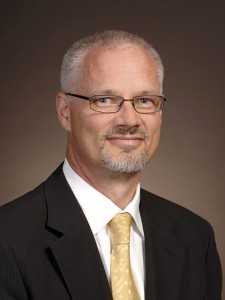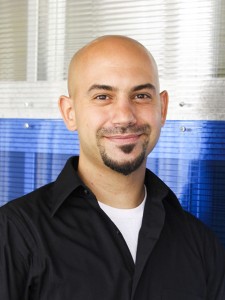
Hjelmstad, Volo honored at Engineers Week

Keith Hjelmstad, professor in the School of Sustainable Engineering and the Built Environment
A professor who has reformed the teaching of mechanics and a graduate student studying urban landscape irrigation recently were honored at the Greater Phoenix Area 2014 Engineers Week awards ceremony.
Keith Hjelmstad was named 2014 Engineering Educator of the Year. He is a professor of civil, environmental and sustainable engineering in the School of Sustainable Engineering and the Built Environment, one of the Ira A. Fulton Schools of Engineering at Arizona State University.
Thomas Volo, who is working on his doctorate in civil, environmental and sustainable engineering in the same school, was named Engineering Student of the Year.
The awards, which recognize engineers, students, educators and projects that have made outstanding contributions to the profession, were presented at the EWeek Gala on Feb. 20 at the Hotel Palomar Phoenix.
Hjelmstad, who has been an educator for more than 30 years, has taught thousands of students and mentored 21 doctoral students.
“Keith Hjelmstad has made an outstanding contribution in improving engineering education at ASU,” wrote Michael S. Mamlouk, professor and chairman of ASU’s Civil, Environmental and Sustainable Engineering Program, in letter nominating Hjelmstad for the award. “Recently, he changed the instruction method of our mechanics classes at ASU, which resulted in greatly improving the performance of our students and enhancing their engineering understanding.”
Hjelmstad led The Mechanics Project, an effort to improve undergraduate mechanics courses based on research that shows people learn best when engaged and curious. The first course Hjelmstad tackled was dynamics.
The new approach involves minimal lectures, only eight per semester, with most work done in a recitation-based format in which small groups of about four students work on problems with peer instructors. Because traditional textbooks didn’t work well with this model, Hjelmstad created new materials that provide fundamentals and focus on problem solving. Students learn in multiple ways, including computing projects, formal reports and peer review, and have multiple opportunities to show mastery through assessments, reducing the stress of testing.
The result is that more students are thriving and fewer are failing or withdrawing, with the promise of increased retention of engineering students. Hjelmstad currently is working with colleagues to reform two other mechanics courses, statics and solid mechanics.
Students have called Hjelmstad a rock star and genius and say they have learned more in his classes than in any others.
“Keith has done a wonderful job in focusing on a weakness in our civil engineering curriculum and making our mechanics course sequence an outstanding experience for our students,” said G. Edward Gibson, director of the School of Sustainable Engineering and the Built Environment. “He is truly revolutionizing the way these classes are delivered in civil engineering curricula, after almost 60 years of teaching these classes in a manner that reached some students, but not all.
“I feel that this ‘reinvention’ of how to teach these materials will continue to pay large dividends as we work to retain more students in the civil engineering field and provide the skill sets to them that will make them lifelong learners.”
Before moving to the School of Sustainable Engineering and the Built Environment, Hjelmstad was university vice president and dean of ASU’s College of Technology and Innovation, and was on the faculty at the University of Illinois at Urbana-Champaign for 25 years. He has a doctorate in civil engineering from the University of California, Berkeley.

Thomas Volo, doctoral student in the School of Sustainable Engineering and the Built Environment. Photo credit: Rosie Gochnour/ASU.
Volo, who has received a Dean’s Fellowship for his doctoral work, is studying the ecohydrology of desert cities. Specifically, his research uses numerical modeling and eddy covariance techniques to investigate the impacts of landscape irrigation on urban surface energy and soil moisture fluxes.
He was nominated by Braden R. Allenby, the Lincoln Professor of Engineering and Ethics and President’s Professor of Civil, Environmental and Sustainable Engineering in the Fulton Schools of Engineering. Volo has been an instructor for Allenby’s Technological, Social and Sustainable Systems course.
“He is capable of the quick and clear reasoning, and the response to complex challenges that mark the true leader and professional,” Allenby states in his nomination letter, writing that Volo regularly excels in highly technical research and the challenging interactivity of student mentoring,
Volo wrote in his nomination materials that even though most of the municipal water supplied to people in the Phoenix area is used outdoors, there is little scientific understanding of what happens to the water used to maintain lawns and urban landscaping.
Volo’s research seeks to conserve urban water use through improved scheduling for residential irrigation. In addition to giving numerous presentations of his findings and recommendations to the academic community and the general public, Volo has submitted his work for publication in the journals Ecohydrology and Landscape and Urban Planning.
“Of course, engineering is also about communication, because even the greatest solutions to the world’s most challenging problems would be for naught if they are not communicated effectively,” Volo stated.
The Greater Phoenix Area 2013 Engineers Week group considers dozens of award nominees from almost 40 local chapters of various professional engineering associations, and roughly an equal number of engineering and construction companies, along with several public agencies and educational institutions.



































